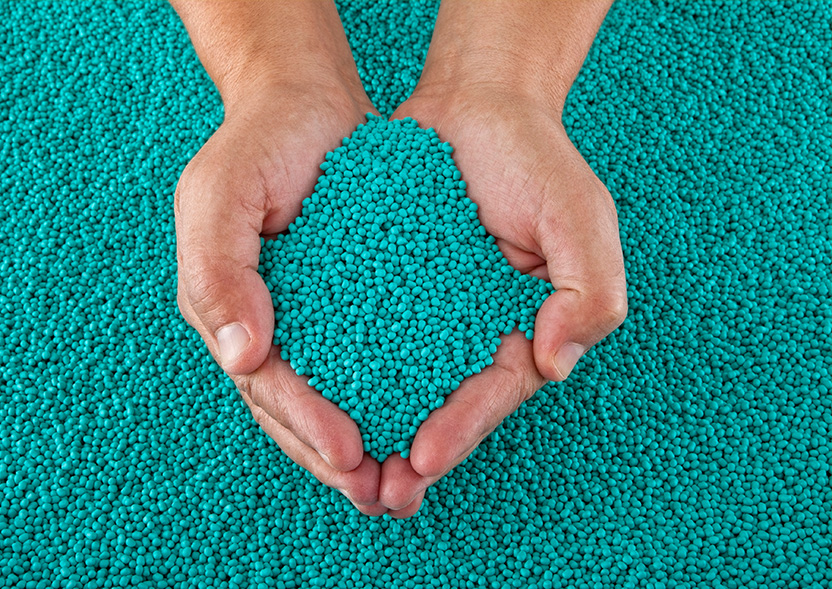Food packaging made from recycled plastics

Recycling and reusing packaging materials are key objectives of the Circular Economy Action Plan adopted by the European Union in 2020. According to the EU, implementing a circular economy should significantly reduce pressures on our natural resources, promote sustainable growth and prevent the loss of biodiversity. One of the targets is to significantly increase the amount of food packaging made from recycled plastics in the future. However, packaging made from recycled materials also has to pass very strict compliance and safety assessments in order to avoid consumer health risks.
A comprehensive testing strategy to ensure the safe use of post-consumer recyclates
A separate testing strategy featuring the comprehensive safety assessment of post-consumer recycled plastics was intended to be developed in the earlier CORNET project »PolyCycle«. The testing strategy involved developing in vitro bioassays and chromatographic analysis with the toxicological classification of volatile substances to detect DNA-reactive substances and then evaluating how suitable they are for analyzing recycled packaging materials that come into contact with foodstuffs. The project revealed that many unknown low volatile substances were present in the recycled material, which are difficult to detect using existing testing methods. These substances are alleged to have genotoxic effects in cell cultures. There is a high probability that the plastics are contaminated with these substances during the recycling process.
The follow-up project »SafeCycle« is therefore aimed at developing a test method for identifying these substances using liquid chromatography as well as high-resolution mass spectrometry in correlation with bioassays. The main goal is to identify the source of contamination in recycled materials. These results will then also be used as part of the project to define measures that prevent future contamination in the long term and promote the use of recycled packaging materials for a range of possible applications (e.g., in food, cosmetic products or household products) without compromising the health and safety of consumers.
Additional investigation methods to identify the cause
With its many years of expertise in analyzing packaging materials to be evaluated in accordance with food legislation, The Fraunhofer IVV is now responsible for conducting systematic screenings to determine the technological origin of the DNA-reactive substances and performing chemical analyses of the materials as part of the »SafeCycle« project. A more in-depth analysis to identify the substances that cause the genotoxic effect then follows. Finally, an »Assistance document« is compiled and published based on the findings.
Project data
The SafeCycle project is funded under the 33rd CORNET (Collective Research Network) call for proposals in cooperation between the research partners Fraunhofer Institute for Process Engineering and Packaging IVV in Germany and Research Partners OFI - Austrian Research Institute for Chemistry and Technology and FH Campus Wien in Austria. In Germany, it is funded as a project of the Research Association of the Industrial Association for Food Technology and Packaging (IVLV e.V.) by the Federal Ministry of Economics and Climate Protection BMWK via the AiF within the framework of the program for the promotion of joint industrial research (IGF) under grant number 354 EN based on a resolution of the German Bundestag. The Austrian Research Promotion Agency (FFG) is funding this work under grant number FO999895421. In Austria, the project is coordinated by the Plastics Cluster of ecoplus. Niederösterreichs Wirtschaftsagentur GmbH.
Project term: |
01.01.2023 to 31.12.2024 |
Project management |
Industry Association for Food Technology and Packaging e.V. (IVLV) - AiF / Federal Ministry for Economic Affairs and Climate Action (BMWK) - funded within the framework of CORNET (Collective Research Networking) / IGF international for the benefit of small and medium-sized enterprises / The Austrian Research Promotion Agency (FFG) |
Coordination |
Kunststoffcluster ecoplus. Niederösterreichs Wirtschaftgsagentur GmbH |
 Fraunhofer Institute for Process Engineering and Packaging IVV
Fraunhofer Institute for Process Engineering and Packaging IVV